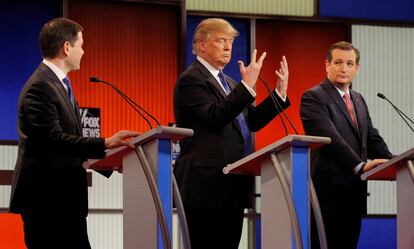The Supreme Court seems likely to rule against a trademark in the ‘Trump too small’ case
Chief Justice John Roberts, positing what might happen if Steve Elster were to win, said people then would race to trademark ‘Trump too this, Trump too that’

The Supreme Court signaled Wednesday that it would rule against a man who wants to trademark the suggestive phrase “Trump too small.” The dispute is over the government’s decision to deny a trademark to Steve Elster, a California man seeking exclusive use of the phrase on T-shirts and potentially other merchandise. It is the latest case relating to former President Donald Trump to reach the Supreme Court, following arguments Tuesday in social media cases with echoes of Trump.
The justices repeatedly invoked the phrase as they questioned whether the government was justified in denying the trademark. Elster’s lawyers argue that the decision violated his free speech rights, and a federal appeals court agreed.
Chief Justice John Roberts, positing what might happen if Elster were to win, said people then would race to trademark “Trump too this, Trump too that.”
The Justice Department is supporting President Joe Biden’s once and possibly future rival. Government officials said the phrase “Trump too small” could still be used, just not trademarked because Trump had not consented to its use. Indeed, “Trump too small” T-shirts already can be purchased online.
Justice Sonia Sotomayor said that distinction was important because Elster is free to say and “sell as many shirts as he wants.” Justice Amy Coney Barrett, one of Trump’s three Supreme Court appointees, leaned into the phrase as she wondered how the court would analyze an imaginary law denying a copyright to an author.
“Somebody wants to write a book called ‘Trump too small’ that details Trump’s pettiness over the years and just argues that he’s not a fit public official,” Barrett said.
Twice in the past six years, the justices have struck down provisions of federal law denying trademarks seen as scandalous or immoral in one case and disparaging in another. The new case deals with another measure calling for a trademark request to be refused if it involves a name, portrait or signature “identifying a particular living individual” unless the person has given “written consent.”
The phrase at the heart of the case is a reference to an exchange Trump had during the 2016 presidential campaign with Florida senator and GOP presidential rival Marco Rubio. Rubio began the verbal jousting when he told supporters at a rally that Trump was always calling him “little Marco” but that Trump — who says he is 6-feet-3-inches tall — has disproportionately small hands. “Have you seen his hands? ... And you know what they say about men with small hands,” Rubio said. “You can’t trust them.”
Trump then brought up the comment at a televised debate on March 3, 2016. “Look at those hands. Are they small hands? And he referred to my hands — if they’re small, something else must be small. I guarantee you there’s no problem. I guarantee you,” he said.
The high court has considered several Trump-related cases in recent years. The justices have dealt with Trump’s claims of fraud in the 2020 election and with his efforts to shield his tax records from Congress and to keep other tax records from prosecutors in New York, among other things.
The justices also could be asked to decide whether Trump can be disqualified from running for the White House again because of his role in the Jan. 6, 2021, assault on the U.S. Capitol. A decision in Vidal v. Elster, 22-704, is expected by early summer.
Sign up for our weekly newsletter to get more English-language news coverage from EL PAÍS USA Edition
Tu suscripción se está usando en otro dispositivo
¿Quieres añadir otro usuario a tu suscripción?
Si continúas leyendo en este dispositivo, no se podrá leer en el otro.
FlechaTu suscripción se está usando en otro dispositivo y solo puedes acceder a EL PAÍS desde un dispositivo a la vez.
Si quieres compartir tu cuenta, cambia tu suscripción a la modalidad Premium, así podrás añadir otro usuario. Cada uno accederá con su propia cuenta de email, lo que os permitirá personalizar vuestra experiencia en EL PAÍS.
¿Tienes una suscripción de empresa? Accede aquí para contratar más cuentas.
En el caso de no saber quién está usando tu cuenta, te recomendamos cambiar tu contraseña aquí.
Si decides continuar compartiendo tu cuenta, este mensaje se mostrará en tu dispositivo y en el de la otra persona que está usando tu cuenta de forma indefinida, afectando a tu experiencia de lectura. Puedes consultar aquí los términos y condiciones de la suscripción digital.








































